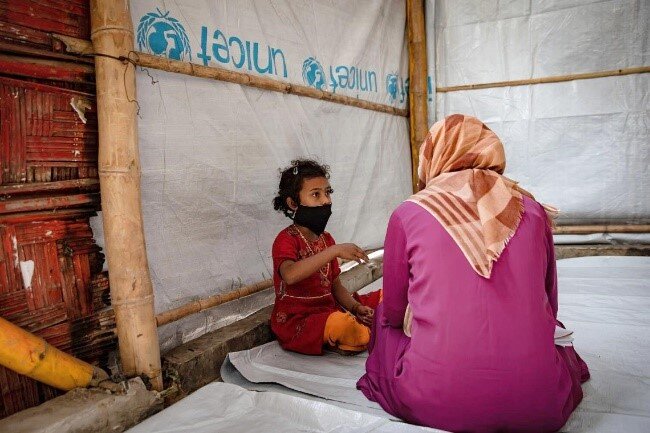By Whitney Simon | Assistant Director, Global Cause Partnerships
Dear Friend,
Bangladesh continues to host over 907,000 Rohingya refugees from Myanmar, with an additional 50,000 refugees entering the country in 2021. The COVID-19 pandemic exacerbated the vulnerabilities of Rohingya refugees, who live in high-density camps with increased transmission risk. The pandemic’s restrictions have fueled an increase in multidimensional poverty, with over 60% of Rohingya households falling in that category compared to 47% in 2019.
These challenges have been exacerbated by natural disasters. Annual monsoons caused damage across learning centers and water and sanitation facilities across the camps; damaging fires have emerged as a consistent challenge as well.
Thanks to the support of individuals like you, UNICEF continues to navigate these challenges to deliver essential services to children and women who need it most. In 2021, UNICEF reached 1.1 million people with COVID-19 prevention and vaccination messages and supported the COVID-19 vaccination of 86% of Rohingya refugees over the age of 55. In parallel, UNICEF maintained access to essential health services for 250,000 Rohingya refugees across ten camps. Nutrition remained a priority, with UNICEF providing 95% of children ages 6-59 months with vitamin A supplementation. Over 97,000 young children also received deworming tablets and UNICEF continued to equip stakeholders with nutrition supplies and training to foster healthy child development.
Learning centers in Cox’s Bazaar reopened in September, allowing 119,444 Rohingya refugee children to attend in-person learning four days a week. UNICEF also invested in school improvements in 657 primary schools, benefitting 180,000 children. Child protection efforts continued in earnest. Information on gender-based violence prevention and risk mitigation reached over 50,000 Rohingya refugees and nearly 8,000 host community members. To prevent sexual exploitation and abuse, UNICEF offered orientations to practitioners to identify and report incidents.
While all of these essential efforts continue, UNICEF also must adapt to the unexpected challenges Rohingya refugees face. After a destructive fire broke out in January 2022, a number of water and education facilities were destroyed and children traumatized. UNICEF’s temporary learning centers offer children an outlet for continued learning and a space to speak with social workers and psychologists to process their fears and anxieties following this incident. For five-year-old Jamila, pictured, UNICEF workers are a key lifeline in the face of great stress.
Due to your generosity, UNICEF will continue to work with and for children such as Jamila to ensure a better future for the Rohingya community. As always, thank you for standing with us in this work.
In Partnership,
Whitney
By Kelly Procida | Manager, Global Cause Partnerships
By Whitney Simon | Manager, Global Cause Partnerships
Project reports on GlobalGiving are posted directly to globalgiving.org by Project Leaders as they are completed, generally every 3-4 months. To protect the integrity of these documents, GlobalGiving does not alter them; therefore you may find some language or formatting issues.
If you donate to this project or have donated to this project, you can receive an email when this project posts a report. You can also subscribe for reports without donating.
